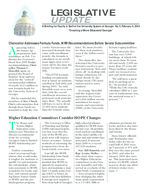LEGISLATIVE UPDATE
A Briefing for Faculty & Staff of the University System of Georgia No. 5, February 9, 2004
"Creating a More Educated Georgia"
Chancellor Addresses Formula Funds, MRR Recommendations Before Senate Subcommittee
A ppearing before the Senate Appropriations Subcommittee on Feb. 5 to discuss the Governor's Fiscal Year 2005 Budget recommendations, Chancellor Thomas C. Meredith again expressed the Board of Regents' deep appreciation for the "critical" recommended addition of nearly $123 million in new formula funds for the University System of Georgia.
But he reminded the members of Sen. Chuck Clay's subcommittee that though these funds are intended to help the Uni-
versity System meet the increased demands that come with enrollment growth, the formula is calculated on an enrollment figure that is two years old by the time the money becomes available.
"The FY'05 formula funding recommendation is based on students enrolled in Fall 2002 and Spring 2003," he said. Meredith went on to note that, with the record enrollment increases experienced each semester since then, "We actually will have to serve about 27,000 more students than the formula calcu-
lates. We must provide for these real numbers, even if the dollars aren't there."
The chancellor also reiterated the University System's resolve to protect instruction "first and above all" in dealing with budget reductions, followed closely by the budget items USG institutions need to serve students.
In closing, Meredith said the regents truly appreciate the Governor's $60 million recommendation for major repairs and renovations (MRR) of the University
System's aging facilities.
The University System has over 3,000 buildings, of which 606 are more than 50 years old and nearly 2,000 are more than 25 years old. These facilities continuously are in need of repair and modernization.
"We still have a great deal of catching up to do," he pointed out. "While the USG formula calculates MRR at 1 percent of replacement cost, the national norm is 3 percent."
Higher Education Committees Consider HOPE Changes
The House and Senate Higher Education committees met Thursday to discuss recommendations for revising Georgia's lottery-funded HOPE Scholarship program.
Neither committee voted on proposed legislation that would make it tougher for students to qualify for and maintain the scholarships, eliminate payments to HOPE recipients for books and fees, and restrict spending future lottery funds to HOPE and the prekindergarten program.
The Governor's Office of Planning and Budget (OPB) informed legislators last year that the cost of the HOPE program soon will outpace lottery revenues. Various methods of reforming the program have been debated widely ever since.
Last fall, the HOPE Scholarship Joint Study Commission recommended that HOPE recipients be required to have and maintain a standard 3.0 grade point average (GPA) or better, instead of the less-definitive B average now required. More than half of Georgia's
high-school graduates qualified for HOPE benefits last year. Meanwhile, total student enrollment in the state's public colleges and universities has increased 20 percent since 2000 to a record 247,020 students.
Sen. Bill Hamrick and Rep. Louise McBee -- who chair their respective Higher Education committees in the General Assembly and who served as co-chairs of the Joint Study Commission -- have proposed legislation changing the minimum grade requirement to a 3.0 GPA. Bills to
eliminate payments for books and fees also have been filed in the House and Senate.
State lottery officials said Wednesday that ticket sales for the second half of 2003 were up 5 percent or $71 million over the same period in 2002, and sales for January 2004 also were up. This generated more money for HOPE, which receives about one third of lottery-ticket revenues.
